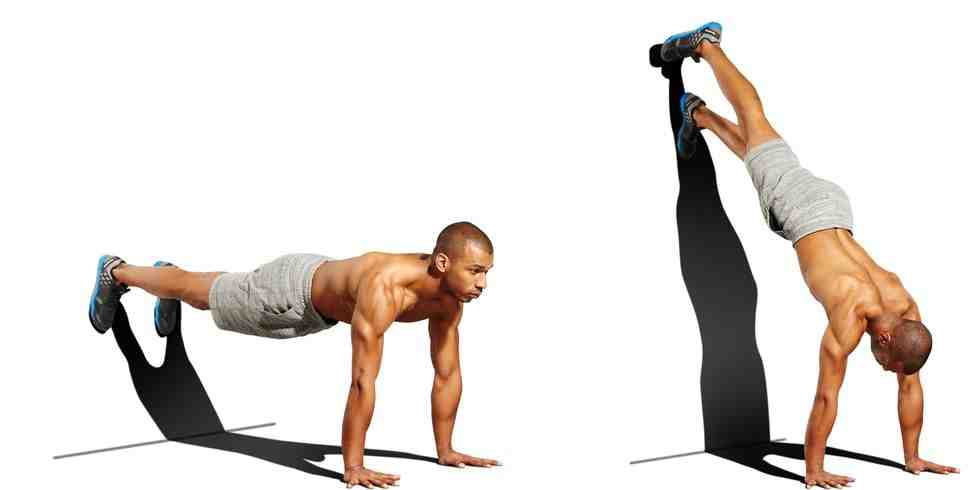“In the world of fitness, there’s a constant debate about the best way to achieve a strong, healthy body. Some swear by the heavy weights and machines found in the gym, while others prefer the simplicity and convenience of bodyweight exercises. But is it really possible to reach your fitness goals using just the weight of your own body? In this article, we delve into the world of bodyweight exercises, exploring their effectiveness, benefits, and how they can be incorporated into your workout routine. Whether you’re a fitness enthusiast or a beginner looking to get started, this article will provide valuable insights into the potential of bodyweight exercises. So, let’s dive in and find out: Is it OK to only do bodyweight exercises?”
What Are Bodyweight Exercises?

Bodyweight exercises are a type of strength training exercise that uses the individual’s own weight to provide resistance against gravity. They are versatile, effective, and can be done anywhere, anytime, without any equipment.
These exercises leverage your body weight to challenge your muscles, which can help you build strength, flexibility, and endurance. They include a variety of movements that target different muscle groups, such as push-ups, squats, lunges, and planks.
SHOP FOR THE WORKOUT SHOES ON AMAZON
Bodyweight exercises are not only convenient but also incredibly beneficial for improving body composition, enhancing movement patterns, and promoting overall health and fitness. Whether you’re a seasoned athlete or a fitness newbie, bodyweight exercises can be a powerful tool in your workout arsenal.
Effectiveness of Bodyweight Exercises
Bodyweight exercises are highly effective for both strength training and improving mobility. They offer several key benefits:
- Convenience: You can perform bodyweight exercises anywhere, anytime, without any equipment.
- Cost-Effective: There’s nothing to buy other than a pair of shoes.
- Low Intimidation Factor: You can do these exercises solo, without the need for a gym or complicated weight machines.
- Builds Muscle: Research shows that bodyweight exercises help build muscle “independent of an external load”.
- Improves Various Fitness Parameters: A study found improvements in seven out of nine physical fitness parameters after 10 weeks of bodyweight exercises.
- Functional Exercise: Most bodyweight exercises work multiple muscles at once, engaging balance and mimicking everyday activities.
What Kind of Pushups Work Upper Chest?
In summary, bodyweight exercises are not only convenient and cost-effective, but they also provide a comprehensive workout that improves strength, endurance, flexibility, and overall fitness. They are a great option for people of all fitness levels and can be easily incorporated into any workout routine.
Types of Bodyweight Exercises
Bodyweight exercises can be categorized into different types based on the muscle groups they target. Here are some examples:
1. Lower-Body Exercises:
- Assisted Bodyweight Squat
- Bodyweight Squat
- Assisted Pistol Squat
- Pistol Squat
- Supported Lunges
- Regular Lunges
- Single-Leg Deadlift
- Hip Bridge
- Calf Raise
- Step Up
- Box Jump
2. Upper-Body Push Exercises:
- Knee Push-Up
- Elevated Push-Up
- Push-Up
- Decline Push-Up
- Side-to-Side Push-Up
- Assisted Dip
- Dip
- Handstand (Wall Walk)
3. Upper-Body Pull Exercises:
- Inverted Bodyweight Row (High)
- Inverted Bodyweight Row (Low)
4. Core Exercises:
- Reverse Crunch
- Knee-Plank
- Plank
- Side Plank
- Hip Bridge Hold
- Hanging Knee Tuck
- Jumping Knee Tuck
- Hollow Body Hold
5. Full-Body Exercises (Dynamic Movements)
Each of these exercises targets specific muscle groups and offers unique benefits.
Advantages and Disadvantages
Bodyweight exercises, which rely solely on the individual’s body weight for resistance, offer several advantages and disadvantages compared to other forms of exercise like using gym equipment or free weights.
Post-Workout Carbs and Muscle Loss
Advantages:
- Accessibility: Bodyweight exercises can be done anywhere, anytime, without the need for any equipment. This makes them ideal for people who don’t have access to a gym or prefer to exercise outdoors.
- Cost-effectiveness: Since no equipment is required, bodyweight exercises are generally very cost-effective. You don’t need to spend money on gym memberships or expensive gear.
- Versatility: There is a wide variety of bodyweight exercises that target different muscle groups and can be modified to suit different fitness levels. From squats and lunges to push-ups and planks, there’s something for everyone.
- Functional strength: Many bodyweight exercises mimic natural movements, helping to improve functional strength and mobility that can translate into better performance in daily activities.
- Lower risk of injury: Because bodyweight exercises typically involve natural movements and don’t require heavy weights, there’s a lower risk of injury compared to exercises using gym equipment.
- Core engagement: Many bodyweight exercises require stabilization of the core muscles, leading to improved core strength and stability.
Disadvantages:
- Limited resistance: Bodyweight exercises primarily rely on the individual’s body weight for resistance. While this is sufficient for beginners and intermediate exercisers, it may become limiting for advanced individuals who require higher levels of resistance to continue making progress.
- Plateauing: Without the ability to progressively increase resistance like you can with weights, it’s easier to plateau with bodyweight exercises, where progress can stagnate over time.
- Not suitable for all goals: While bodyweight exercises can improve strength, endurance, and flexibility, they may not be the most effective choice for certain fitness goals, such as bodybuilding or powerlifting, where heavier weights are typically used.
- Difficulty with certain exercises: Some bodyweight exercises, such as pull-ups or handstand push-ups, can be challenging for beginners and may require a certain level of strength and skill to perform correctly.
- Variety limitations: While there is a wide variety of bodyweight exercises available, the range may still be limited compared to the variety offered by gym equipment. This can lead to boredom or a lack of motivation for some individuals.
- Progress tracking: Unlike using weights where you can easily track progress by increasing the load, tracking progress with bodyweight exercises can be less straightforward, which may be discouraging for some individuals.
SHOP FOR THE PROTEIN POWDER ON AMAZON
Overall, bodyweight exercises offer numerous benefits, but they may not be suitable for everyone or all fitness goals. Incorporating a variety of exercises and training modalities into your routine can help you achieve a well-rounded level of fitness.
Is it OK to Only do Bodyweight Exercises?
Yes, it’s absolutely okay to only do bodyweight exercises as part of your fitness routine. Bodyweight exercises can be highly effective for building strength, improving flexibility, and increasing cardiovascular fitness, especially for beginners or those without access to gym equipment.
Bodyweight exercises utilize your own body weight as resistance, meaning you can do them anywhere, anytime, without the need for special equipment. They can target multiple muscle groups simultaneously and can be easily modified to suit different fitness levels, making them suitable for people of all ages and abilities.
Why Bodybuilders Take L-glutamine
Popular bodyweight exercises include push-ups, squats, lunges, planks, burpees, and many others. By incorporating a variety of bodyweight exercises and progressively increasing the intensity or difficulty, you can create a well-rounded workout routine that challenges your muscles and helps you achieve your fitness goals.
However, it’s important to ensure proper form and technique to avoid injury. Additionally, if your goal is to build muscle mass significantly, you may eventually need to incorporate additional resistance through weights or other equipment. But for general fitness, bodyweight exercises can be more than sufficient.
FAQs
Q 1. Can you build muscle with bodyweight exercises?
Ans. Yes, research shows that bodyweight exercises help build muscle “independent of an external load”.
Q 2. Can bodyweight exercises replace weightlifting?
Ans. While bodyweight exercises can be an effective part of a balanced fitness routine, they may not be as effective as weightlifting for targeting specific muscles or continuously adding more resistance.
Q 3. How can I increase the intensity of my bodyweight workout?
Ans. You can increase the intensity of your bodyweight workout by adding more repetitions, reducing rest time between sets, or modifying the exercises to make them more challenging.
Q 4. Are bodyweight exercises safe for beginners?
Ans. Yes, bodyweight exercises are generally safe for beginners. However, it’s always a good idea to start slow, focus on form, and gradually increase intensity as your fitness level improves.
Q 5. How often should I do bodyweight exercises?
Ans. The frequency of bodyweight exercises depends on your fitness goals and level. A common recommendation is to perform strength training exercises, including bodyweight exercises, 2-3 times per week.
Q 6. Can I lose weight with bodyweight exercises?
Ans. Yes, bodyweight exercises can help you lose weight by burning calories and building muscle, which can boost your metabolism.
Conclusion
In conclusion, bodyweight exercises offer a versatile, cost-effective, and convenient way to improve strength, flexibility, and overall fitness. They can be done anywhere, anytime, without any equipment, making them a great option for people of all fitness levels. While they may have limitations in terms of resistance and targeting specific muscles, they can still be an effective part of a balanced fitness routine.
So, is it OK to only do bodyweight exercises? The answer largely depends on your personal fitness goals. If you’re looking for a simple, accessible way to stay fit and healthy, bodyweight exercises could be just what you need. However, if you have specific fitness goals like building large muscles or targeting specific muscle groups, you might need to incorporate weightlifting or other forms of exercise into your routine. As always, it’s best to consult with a fitness professional to create a workout plan that’s tailored to your individual needs and goals.

Good day, and welcome to Fitthour. My name is Shubham Vijay, and I am a certified personal trainer and nutrition coach with 6 years of experience in the fitness industry. At Fitthour, we specialize in types of training, such as strength training, cardio, or HIIT, and our mission is to help clients achieve their fitness goals and improve their overall health.

